一般将来时语法规则及练习题(附答案)
(完整版)一般将来时态讲解及练习和答案
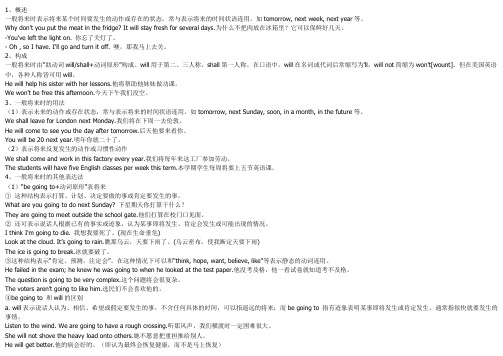
1、概述一般将来时表示将来某个时间要发生的动作或存在的状态,常与表示将来的时间状语连用,如tomorrow, next week, next year等。
Why don’t you put the meat in the fridge? It will stay fresh for several days.为什么不把肉放在冰箱里?它可以保鲜好几天。
-You've left the light on. 你忘了关灯了。
- Oh , so I have. I'll go and turn it off. 噢,那我马上去关。
2、构成一般将来时由“助动词will/shall+动词原形”构成。
will用于第二、三人称,shall第一人称。
在口语中,will在名词或代词后常缩写为'll,will not简缩为won’t[wount]。
但在美国英语中,各种人称皆可用will。
He will help his sister with her lessons.他将帮助他妹妹做功课。
We won't be free this afternoon.今天下午我们没空。
3、一般将来时的用法(1)表示未来的动作或存在状态,常与表示将来的时间状语连用,如tomorrow, next Sunday, soon, in a month, in the future等。
We shall leave for London next Monday.我们将在下周一去伦敦。
He will come to see you the day after tomorrow.后天他要来看你。
You will be 20 next year.明年你就二十了。
(2)表示将来反复发生的动作或习惯性动作We shall come and work in this factory every year.我们将每年来这工厂参加劳动。
英语时态之一般将来时(练习题及答案)

英语时态之一般将来时一、什么是时态时态就是表示一个动作发生的时间和所处的状态。
“时”就是这个动作发生的“时间”;“态”就是这个动作在某个时刻的“状态”。
二、时间的定义英语中把时间分为三类,即:过去现在将来三、状态的定义状态指的是在某个时刻这个动作所处于的状态。
动词共有四类状态,分别为:一般式、进行式、完成式和进行完成式。
1.一般式表示经常发生的动作,其动词形式为do例:I often get up at 7.我经常在七点钟起床。
2.进行式表示正在进行的动作,其动词形式为“be动词+ doing”例:She is singing a French song.她正在唱一首法语歌。
3.完成式表示对“之前发生动作”的一个总结,其动词形式为“have + done”例:They have found the missing child.他们找到那个失踪的孩子了。
4.完成进行式表示对“正在进行动作”的一个总结,其动词形式“have + been + doing”例:I have been reading books for two hours.我已经连续读书两个小时了。
四.一般将来时(will do):一般将来时表示某个将来的时间发生的动作或存在的状态。
1.在表示预测时,在一般将来时态中will和be going to的区别:(1).用be going to 特别指根据目前的明显迹象来推断某件事将要发生;而will则只是表明说话人认为或相信某件事将要发生。
(2).be going to 通常用来表示说话人预期所说的事件马上或在相当近的将来就要发生;而will 所表示的动作发生的时间可近可远。
2.在表示意愿时,在一般将来时态中will和be going to 的区别:(1)be going to 表示说话人对未来行动的计划或打算,通常是经过事先考虑并含有已经为这一行动做了某些准备的意思。
(2)will表示在说话的时刻立即做出决定将去做某事,事先并没有经过考虑,更没有为这一活动做出事先的准备。
英语一般将来时答题技巧及练习题(含答案)
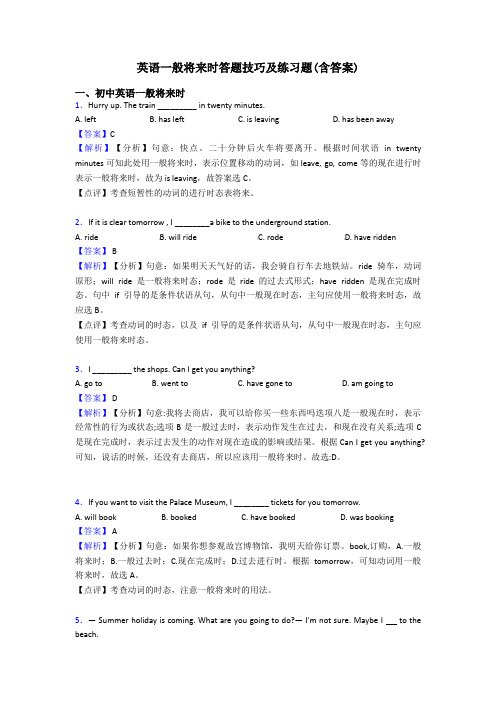
英语一般将来时答题技巧及练习题(含答案)一、初中英语一般将来时1.Hurry up. The train _________ in twenty minutes.A. leftB. has leftC. is leavingD. has been away【答案】C【解析】【分析】句意:快点。
二十分钟后火车将要离开。
根据时间状语in twenty minutes可知此处用一般将来时,表示位置移动的动词,如leave, go, come等的现在进行时表示一般将来时,故为is leaving,故答案选C。
【点评】考查短暂性的动词的进行时态表将来。
2.If it is clear tomorrow , I ________a bike to the underground station.A. rideB. will rideC. rodeD. have ridden【答案】 B【解析】【分析】句意:如果明天天气好的话,我会骑自行车去地铁站。
ride骑车,动词原形;will ride是一般将来时态;rode是ride的过去式形式;have ridden是现在完成时态。
句中if引导的是条件状语从句,从句中一般现在时态,主句应使用一般将来时态,故应选B。
【点评】考查动词的时态,以及if引导的是条件状语从句,从句中一般现在时态,主句应使用一般将来时态。
3.I _________ the shops. Can I get you anything?A. go toB. went toC. have gone toD. am going to【答案】 D【解析】【分析】句意:我将去商店,我可以给你买一些东西吗迭项八是一般现在时,表示经常性的行为或状态;选项B是一般过去时,表示动作发生在过去,和现在没有关系;选项C 是现在完成时,表示过去发生的动作对现在造成的影响或结果。
根据Can I get you anything?可知,说话的时候,还没有去商店,所以应该用一般将来时。
一般将来时讲解及练习(含答案)
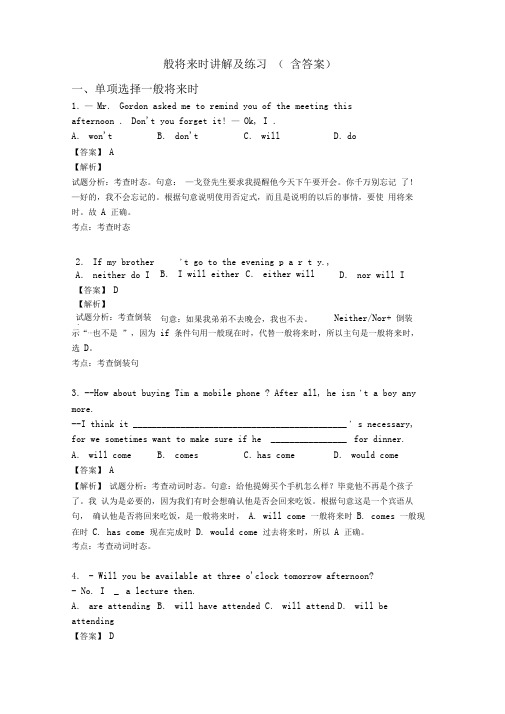
般将来时讲解及练习(含答案)一、单项选择一般将来时1.—Mr.Gordon asked me to remind you of the meeting thisafternoon .Don't you forget it! —Ok, I .A.won't B.don't C.will D.do【答案】A【解析】试题分析:考查时态。
句意:—戈登先生要求我提醒他今天下午要开会。
你千万别忘记了!—好的,我不会忘记的。
根据句意说明使用否定式,而且是说明的以后的事情,要使用将来时。
故A 正确。
考点:考查时态2.If my brother doesn 't go to the evening p a r t y.,A.neither do I B.I will either C.either willI D.nor will I【答案】D 【解析】试题分析:考查倒装句:句意:如果我弟弟不去晚会,我也不去。
Neither/Nor+ 倒装句,表示“⋯也不是”,因为if 条件句用一般现在时,代替一般将来时,所以主句是一般将来时,选D。
考点:考查倒装句3.--How about buying Tim a mobile phone ? After all, he isn 't a boy any more.--I think it _____________________________________________ ' s necessary, for we sometimes want to make sure if he ________________ for dinner. A.will come B.comes C.has come D.would come【答案】A【解析】试题分析:考查动词时态。
句意:给他提姆买个手机怎么样?毕竟他不再是个孩子了。
我认为是必要的,因为我们有时会想确认他是否会回来吃饭。
一般将来时测试题130道(含答案)
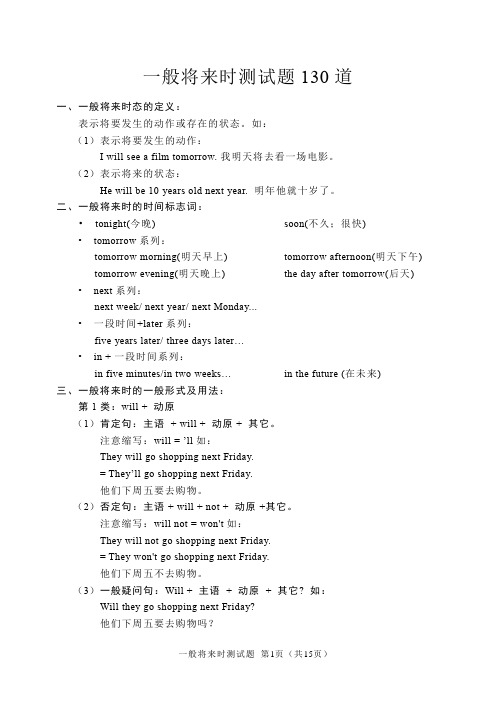
一般将来时测试题130道一、一般将来时态的定义:表示将要发生的动作或存在的状态。
如:(1)表示将要发生的动作:I will see a film tomorrow.我明天将去看一场电影。
(2)表示将来的状态:He will be 10years old next year. 明年他就十岁了。
二、一般将来时的时间标志词:•tonight(今晚)soon(不久;很快)• tomorrow系列:tomorrow morning(明天早上)tomorrow afternoon(明天下午)tomorrow evening(明天晚上)the day after tomorrow(后天)• next系列:next week/ next year/next Monday...• 一段时间+later系列:five years later/three days later…• in +一段时间系列:in five minutes/in two weeks…in the future (在未来)三、一般将来时的一般形式及用法:第1类:will + 动原(1)肯定句:主语+ will + 动原+ 其它。
注意缩写:will = ’ll如:They will go shopping next Friday.= They’ll go shopping next Friday.他们下周五要去购物。
(2)否定句:主语+ will + not + 动原+其它。
注意缩写:will not = won't如:They will not go shopping next Friday.= They won't go shopping next Friday.他们下周五不去购物。
(3)一般疑问句:Will + 主语+ 动原+ 其它? 如:Will they go shopping next Friday?他们下周五要去购物吗?(4)特殊疑问句:特殊疑问词+will + 主语+ 动原+其它?What will they do tomorrow?他们明天将做什么?注意:助动词shall一般主要用于第一人称I或we第2类:be going to + 动原(1)肯定句:主语+ be动词+ going to + 动原+其它.如:They are going to have an English test next week.他们下周有一场英语考试。
(完整word版)一般将来时练习题及答案学习
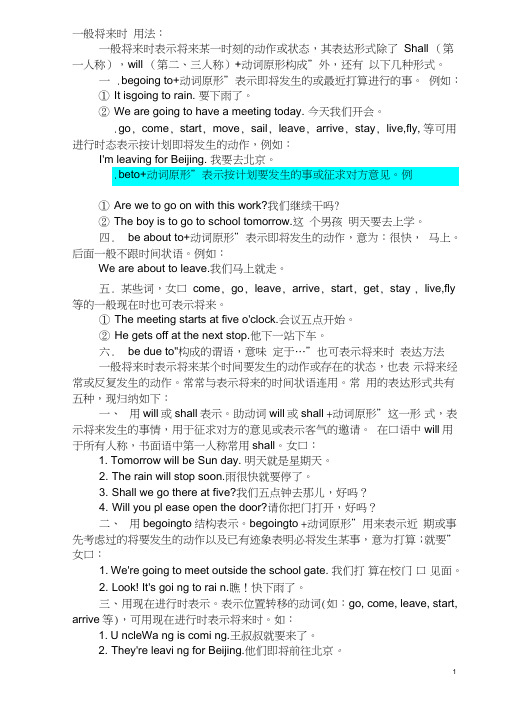
一般将来时用法:一般将来时表示将来某一时刻的动作或状态,其表达形式除了Shall (第一人称),will (第二、三人称)+动词原形构成”外,还有以下几种形式。
一 .begoing to+动词原形”表示即将发生的或最近打算进行的事。
例如:①It isgoing to rain. 要下雨了。
②We are going to have a meeting today. 今天我们开会。
.go, come, start, move, sail, leave, arrive, stay, live,fly, 等可用进行时态表示按计划即将发生的动作,例如:①Are we to go on with this work?我们继续干吗?②The boy is to go to school tomorrow.这个男孩明天要去上学。
四.be about to+动词原形”表示即将发生的动作,意为:很快,马上。
后面一般不跟时间状语。
例如:We are about to leave.我们马上就走。
五.某些词,女口come, go, leave, arrive, start, get, stay , live,fly 等的一般现在时也可表示将来。
①The meeting starts at five o'clock.会议五点开始。
②He gets off at the next stop.他下一站下车。
六.be due to"构成的谓语,意味定于…”也可表示将来时表达方法一般将来时表示将来某个时间要发生的动作或存在的状态,也表示将来经常或反复发生的动作。
常常与表示将来的时间状语连用。
常用的表达形式共有五种,现归纳如下:一、用will或shall表示。
助动词will或shall +动词原形”这一形式,表示将来发生的事情,用于征求对方的意见或表示客气的邀请。
在口语中will用于所有人称,书面语中第一人称常用shall。
专题10 一般将来时_备战2021年小升初英语必考语法和题型(解析版)

专题10 一般将来时一、一般将来时的概念一般将来时表示将来某个时间要发生的动作或存在的状态。
如:I am going to play football tomorrow.我明天打算去踢足球。
Amy will be 12 years old next year. 艾米明年计12岁了。
There will be a football match in our school next week. 我们学校下周将举行一场足球比赛。
二、一般将来时的动词结构①主语+be going to + 动词原形+其它。
②主语+will + 动词原形+其它。
三、一般将来时的句式结构1. 含有be going to的句型(1) 肯定句:主语+ be going to +动词原形+其他。
如:I'm going to have a picnic this afternoon. 今天下午我将要去野餐。
(2) 否定句:主语+be+ not going to +动词原形+其他。
如:I'm not going to have a picnic this afternoon. 今天下午我将不去野餐。
(3) 一般疑问句:Be +主语+ going to +动词原形+其他?肯定回答:Yes, 主语+be.否定回答:No, 主语+ be + not. 如:例:I am going to have a picnic this afternoon. 我今天下午要去野餐。
(改为一般疑问句并作回答) —Are you going to have a picnic this afternoon? 你今天下午将要去野餐吗?—Yes, I am. 是的,我要去。
—No, I’m not. 不,我不去。
(4) 特殊疑问句:特殊疑问词+一般疑问句?What are you going to do tomorrow? 你明天将要去做什么?例:Sam is going to have a birthday party this Friday. 山姆这周五将有一个生日派对。
一般将来时语法规则及练习题(附答案)
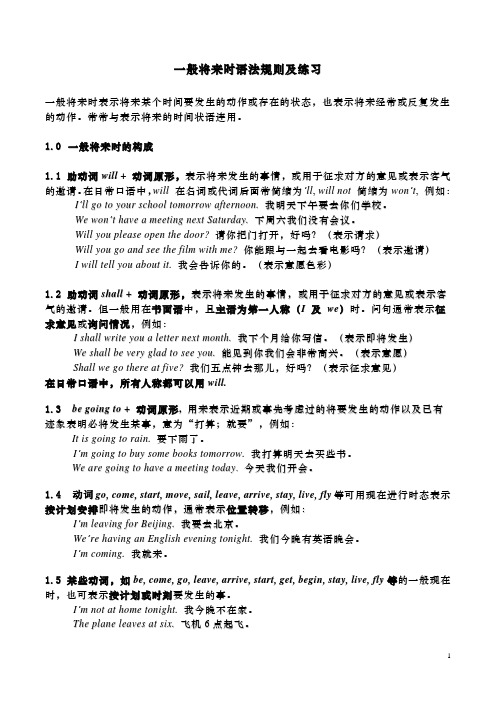
一般将来时语法规则及练习一般将来时表示将来某个时间要发生的动作或存在的状态,也表示将来经常或反复发生的动作。
常常与表示将来的时间状语连用。
1.0一般将来时的构成1.1助动词w i l l+动词原形,表示将来发生的事情,或用于征求对方的意见或表示客气的邀请。
在日常口语中,w i l l在名词或代词后面常简缩为’l l,w i l l n o t简缩为w o n’t,例如:I’l l g o t o y o u r s c h o o l t o m o r r o w a f t e r n o o n.我明天下午要去你们学校。
W e w o n’t h a v e a m e e t i n g n e x t S a t u r d a y.下周六我们没有会议。
W i l l y o u p l e a s e o p e n t h e d o o r?请你把门打开,好吗?(表示请求)W i l l y o u g o a n d s e e t h e f i l m w i t h m e?你能跟与一起去看电影吗?(表示邀请)I w i l l t e l l y o u a b o u t i t.我会告诉你的。
(表示意愿色彩)1.2助动词s h a l l+动词原形,表示将来发生的事情,或用于征求对方的意见或表示客气的邀请。
但一般用在书面语中,且主语为第一人称(I及w e)时。
问句通常表示征求意见或询问情况,例如:I s h a l l w r i t e y o u a l e t t e r n e x t m o n t h.我下个月给你写信。
(表示即将发生)W e s h a l l b e v e r y g l a d t o s e e y o u.能见到你我们会非常高兴。
(表示意愿)S h a l l w e g o t h e r e a t f i v e?我们五点钟去那儿,好吗?(表示征求意见)在日常口语中,所有人称都可以用w i l l.1.3b e g o i n g t o+动词原形,用来表示近期或事先考虑过的将要发生的动作以及已有迹象表明必将发生某事,意为“打算;就要”,例如:I t i s g o i n g t o r a i n.要下雨了。
英语一般将来时课堂语法笔记+习题(含答案)

一般将来时(The Simple Future tense)课堂语法笔记及习题一、概念及用法。
1. 表示将要发生的动作或存在的状态(will do)。
e.g. He will visit our school in half an hour.He will be very happy if he receives many gifts.2. 表示计划或打算做某事(be going to do)。
e.g. He is going to do his homework this afternoon.二、基本结构。
1. will do结构肯定句:主语+ will + 动词原形+ 其他. I will go and buy some beef.否定句:主语+ will + not(won't) + 动词原形+ 其他. I won't go and buy some beef.一般疑问句:Will +主语+动词原形+ 其他? Will you go and buy some beef?2. be going to do结构肯定句:主语+ be going to + 动词原形+ 其他. He is going to see a film tomorrow.否定句:主语+ be + not + going to + 动词原形+ 其他. He isn't going to see a film tomorrow. 一般疑问句:Be + 主语+ going to + 动词原形+ 其他. Is he going to see a film tomorrow? 三、标志词(时间状语)(一秒识别时态)tomorrow 明天, tonight今晚, the day after tomorrow后,next week (month, year …)下一周(月、年), this afternoon, evening …这个下午、晚上, soon不久、很快, in 2050 在2050年, in + 时间段(例如:in 5 years )5年后等。
小学英语一般将来时练习题及答案

小学英语一般将来时练习题及答案be going to =will 翻译为“将;将要”一、概念:表示将要发生的动作或存在的状态句中一般有以下时间状语:tonight,in the future,tomorrow, next day,soon, the day after tomorrow,this morning,this afternoon 二、基本结构:①主语+be going to + do;②主语+will+ do. 三、否定句:在①be动词后加not.I’m going to have a picnic this afternoon. → I’m not going to have a picnic this afternoon.四、对划线部分提问。
一般情况,一般将来时的对划线部分有三种情况。
1. 问人 Whom going to go to New York soon. →Who is going to go to New York soon?. 问干什么 What ? do.→What is your father going to do with you this afternoon?3. 问什么时候 When.→When is she going to go to bed? 五、同义句:be going to = will一、完成句子。
1. 我打算明天和朋友去野炊。
I_____ _______ _________ have a picnic with my friends. =I ________ have a picnic with my friends. .下个星期一你打算去干嘛? 我想去打篮球。
What ________ ________ _________ _________ _________ next Monday?I _______ ______ _____ play basketball.=What _________ you do next Monday? I ________ play basketball. 二、选择答案。
一般将来时讲解(附习题+答案)

一般将来时讲解(附习题+答案)一、一般将来时的含义:表示动作发生在将来二、一般将来时的句型:(1) will/shall+动词原形(2) be going to+动词原形三、一般将来时的时间状语:tomorrow(明天)、the day after tomorrow(后天)、next...(下一...): next week(下一周)、next year(明年)、next month(下个月)in+一段时间(...之后): in three days(三天之后)、in the future在未来this evening(今天晚上)四、一般将来时的句型结构:(1) will/shall+动词原形(will not =won’t)(will 各种人称均可用,shall 只能用于第一人称)1)肯定句:主语+will/shall+动词原型...如:I will go to school tomorrow.我明天将会去学校He will go to school tomorrow.他明天将会去学校。
2)否定句:主语+will/shall+not+动词原型...如:I won’t go to school tomorrow.我明天将不会去学校。
He won’t go to school tomorrow.他明天将不会去学校。
3)一般疑问句:Will/Shall +主语+动词原型...如:Will you go to school tomorrow?你明天要去学校吗?Will he go to school tomorrow?他明天要去学校吗?肯定回答:Yes, 主语+will.如:Yes, I will.Yes, he will.否定回答:No,主语+will+not.如:No, I won’t.No, he won’t.4) 特殊疑问句:特殊疑问词+will/shall+主语+动词原型...如:What will you do tomorrow?你明天将会做什么?What will he do tomorrow?他明天将会做什么?(2) be going to+动词原形1)肯定句:主语+be going to +动词原型...如:I am going to buy some books tomorrow.我明天打算去买一些书。
一般将来时(附讲义和答案)
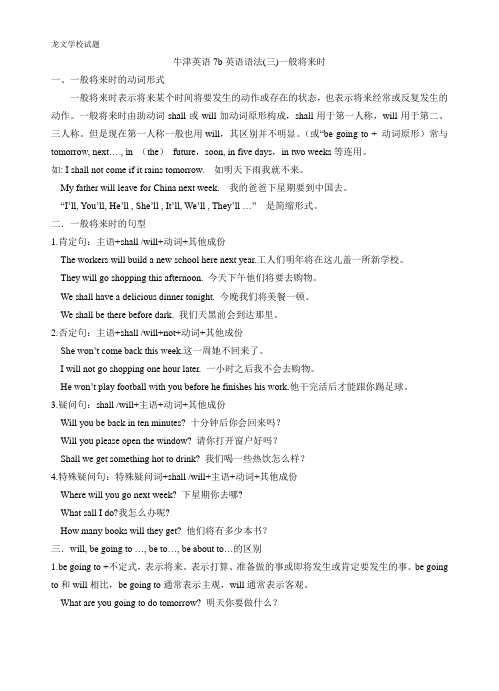
牛津英语7b英语语法(三)一般将来时一、一般将来时的动词形式一般将来时表示将来某个时间将要发生的动作或存在的状态,也表示将来经常或反复发生的动作。
一般将来时由助动词shall或will加动词原形构成,shall用于第一人称,will用于第二、三人称。
但是现在第一人称一般也用will,其区别并不明显。
(或“be going to + 动词原形)常与tomorrow, next… , in (the)future,soon, in five days,in two weeks等连用。
如: I shall not come if it rains tomorrow.如明天下雨我就不来。
My father will leave for China next week.我的爸爸下星期要到中国去。
“I’ll, You’ll, He’ll , She’ll , It’ll, We’ll , They’ll …”是简缩形式。
二.一般将来时的句型1.肯定句:主语+shall /will+动词+其他成份The workers will build a new school here next year.工人们明年将在这儿盖一所新学校。
They will go shopping this afternoon. 今天下午他们将要去购物。
We shall have a delicious dinner tonight. 今晚我们将美餐一顿。
We shall be there before dark. 我们天黑前会到达那里。
2.否定句:主语+shall /will+not+动词+其他成份She won’t come back this week.这一周她不回来了。
I will not go shopping one hour later. 一小时之后我不会去购物。
He won’t play football with you before he finishes his work.他干完活后才能跟你踢足球。
一般将来时练习题及答案 (2)

一般将来时练习题及答案一般将来时是英语中的一种时态,用来表示将来的动作、事件或状态。
在使用一般将来时时,我们通常使用助动词“will”加上动词原形来构成。
以下是一些练习题及答案,帮助你巩固一般将来时的用法。
一、基础练习1.请用适当的动词形式填空:–I __________ (finish) my homework later.–She __________ (not come) to the party tomorrow.–We __________ (visit) our grandparents next week.–They __________ (not go) to the beach this summer.答案: - will finish - will not come - will visit - will not go2.请改写下列句子,使用一般将来时:–She is going to buy a new car next month.–They are not going to travel to Japan next year.–I am going to visit my friend this weekend.答案: - She will buy a new car next month. - They will not travel to Japan next year. - I will visit my friend this weekend.二、交际练习1.请根据下列对话,填写合适的一般将来时形式:–A: What are you doing this weekend?–B: I __________ (go) to the cinema with my friends.答案: - B: I will go to the cinema with my friends.2.请根据下列对话,改写句子,使用一般将来时:–A: Are you going to finish the report by tomorrow?–B: No, I will not finish the report by tomorrow.答案: - A: Will you finish the report by tomorrow? - B: No, I will not finish the report by tomorrow.三、阅读理解请阅读下面的短文,并回答问题:John and Lisa are planning a trip to France for their summer vacation. They__________ (fly) to Paris next week and will spend two weeks there. They __________ (visit) famous landmarks such as the Eiffel Tower and the Louvre Museum. They are also going to try traditional French cuisine and __________ (participate) in a cooking class. After their time in Paris, they __________ (travel) to other cities like Marseille and Nice. They __________ (return) home at the end of the month.1.John and Lisa are going to fly to Paris next week.2.They are going to spend two weeks in Paris.3.They are going to visit famous landmarks in Paris.4.John and Lisa are not going to try traditional French cuisine.5.They are going to participate in a cooking class.答案: 1. True 2. True 3. True 4. False 5. True四、写作练习请根据以下提示,写一篇关于你将来计划的文章,并使用一般将来时:•Where do you want to travel?•When do you want to go?•What do you want to do or see there?•Who do you want to go with?示例:I want to travel to Japan next year. I will go during the spring because I want to see the cherry blossoms. I want to visit famous cities like Tokyo and Kyoto and try traditional Japanese food. I also want to visit historic temples and take part in a tea ceremony. I want to go with my family because it will be a great experience to share together.五、总结一般将来时是英语中表示将来的一种时态,使用助动词“will”加上动词原形构成。
初中一般将来时练习题及答案

初中一般将来时练习题及答案一、动词的一般将来时形式:情态动词will/shall + 动词原形1. I (watch) a movie tonight.2. They (visit) their grandparents tomorrow.3. She (do) her homework after dinner.4. We (go) hiking this weekend.5. He (play) basketball with his friends next Sunday.6. The dog (bark) when it sees strangers.7. The students (have) a test next Monday.8. My parents (travel) to Japan next month.9. We (meet) at the park at 5 o'clock.10. Sarah (read) a book in the library this evening.答案:1. will watch2. will visit3. will do4. will go5. will play6. will bark7. will have8. will travel9. will meet10. will read二、用所给的动词的适当形式填空(有些已经给出)1. Lucy ______ (not play) computer games after school.2. The students ______ (not have) a holiday next week.3. Sam ______ (not go) swimming tomorrow.4. They ______ (not bring) any food to the party.5. We ______ (not watch) TV tonight.6. ______ she ______ (visit) her grandmother on Sunday?7. ______ you ______ (do) your homework tonight?8. ______ they ______ (travel) to Beijing next month?答案:1. will not play2. will not have3. will not go4. will not bring5. will not watch6. Will; visit7. Will; do8. Will; travel三、选择填空1. We ___________ to the beach this afternoon.A. wentB. will goC. goD. are going2. He ________ exercise every morning.A. will doB. doC. doesD. did3. ________ Alice _______ a party tomorrow?A. Will; haveB. Does; haveC. Did; haveD. Will; has4. I _________ my homework after dinner.A. will finishB. finishedC. finishD. will finished5. They ________ late for school tomorrow.A. areB. wereC. will beD. do答案:1. B2. C3. A4. A5. C四、将下列句子改写成一般将来时1. I go swimming every Sunday.2. We have a test next week.3. They travel to China every summer.4. She plays the piano every day.5. He buys a new car.答案:1. I will go swimming every Sunday.2. We will have a test next week.3. They will travel to China every summer.4. She will play the piano every day.5. He will buy a new car.总结:初中的一般将来时是由情态动词will/shall + 动词原形构成的。
- 1、下载文档前请自行甄别文档内容的完整性,平台不提供额外的编辑、内容补充、找答案等附加服务。
- 2、"仅部分预览"的文档,不可在线预览部分如存在完整性等问题,可反馈申请退款(可完整预览的文档不适用该条件!)。
- 3、如文档侵犯您的权益,请联系客服反馈,我们会尽快为您处理(人工客服工作时间:9:00-18:30)。
一般将来时语法规则及练习一般将来时表示将来某个时间要发生的动作或存在的状态,也表示将来经常或反复发生的动作。
常常与表示将来的时间状语连用。
1.0一般将来时的构成1.1助动词w i l l+动词原形,表示将来发生的事情,或用于征求对方的意见或表示客气的邀请。
在日常口语中,w i l l在名词或代词后面常简缩为’l l,w i l l n o t简缩为w o n’t,例如:I’l l g o t o y o u r s c h o o l t o m o r r o w a f t e r n o o n.我明天下午要去你们学校。
W e w o n’t h a v e a m e e t i n g n e x t S a t u r d a y.下周六我们没有会议。
W i l l y o u p l e a s e o p e n t h e d o o r?请你把门打开,好吗?(表示请求)W i l l y o u g o a n d s e e t h e f i l m w i t h m e?你能跟与一起去看电影吗?(表示邀请)I w i l l t e l l y o u a b o u t i t.我会告诉你的。
(表示意愿色彩)1.2助动词s h a l l+动词原形,表示将来发生的事情,或用于征求对方的意见或表示客气的邀请。
但一般用在书面语中,且主语为第一人称(I及w e)时。
问句通常表示征求意见或询问情况,例如:I s h a l l w r i t e y o u a l e t t e r n e x t m o n t h.我下个月给你写信。
(表示即将发生)W e s h a l l b e v e r y g l a d t o s e e y o u.能见到你我们会非常高兴。
(表示意愿)S h a l l w e g o t h e r e a t f i v e?我们五点钟去那儿,好吗?(表示征求意见)在日常口语中,所有人称都可以用w i l l.1.3b e g o i n g t o+动词原形,用来表示近期或事先考虑过的将要发生的动作以及已有迹象表明必将发生某事,意为“打算;就要”,例如:I t i s g o i n g t o r a i n.要下雨了。
I’m g o i n g t o b u y s o m e b o o k s t o m o r r o w.我打算明天去买些书。
W e a r e g o i n g t o h a v e a m e e t i n g t o d a y.今天我们开会。
1.4动词g o,c o m e,s t a r t,m o v e,s a i l,l e a v e,a r r i v e,s t a y,l i v e,f l y等可用现在进行时态表示按计划安排即将发生的动作,通常表示位置转移,例如:I’m l e a v i n g f o r B e i j i n g.我要去北京。
W e’r e h a v i n g a n E n g l i s h e v e n i n g t o n i g h t.我们今晚有英语晚会。
I’m c o m i n g.我就来。
1.5某些动词,如b e,c o m e,g o,l e a v e,a r r i v e,s t a r t,g e t,b e g i n,s t a y,l i v e,f l y等的一般现在时,也可表示按计划或时刻要发生的事。
I’m n o t a t h o m e t o n i g h t.我今晚不在家。
T h e p l a n e l e a v e s a t s i x.飞机6点起飞。
T h e m e e t i n g s t a r t s a t f i v e o'c l o c k.会议五点开始。
H e g e t s o f f a t t h e n e x t s t o p.他下一站下车1.6b e+动词不定式(b e+t o+动词原形)结构表示按计划安排要发生的事或用来征求对方意见,例如:A r e w e t o g o o n w i t h t h i s w o r k?我们继续干吗?T h e b o y i s t o g o t o s c h o o l t o m o r r o w.这个男孩明天要去上学。
T h e s h o p i s t o b e o p e n e d n e x t w e e k.这个商店下周开业。
T h e f a c t o r y i s t o g o i n t o p r o d u c t i o n n e x t y e a r.这个工厂明年投产。
1.7b e a b o u t t o+动词原形,表示即将发生的动作,意为:很快,马上。
后面一般不跟时间状语,例如:W e a r e a b o u t t o l e a v e.我们马上就走。
T h e y'r e a b o u t t o l e a v e.(=T h e y'r e l e a v i n g.)他们就要走了。
1.8b e d u e t o构成的谓语,意味“定于、预计…”也可表示将来时,例如:T h e p a r c e l i s d u e t o a r r i v e i n G u a n g z h o u o n1s t M a y.包裹预计5月1日到广州。
2.0一般将来时的时间状语2.1含n e x t的短语:next week / next month/next year / next term2.2含t o m o r r o w的短语:tomorrow morning /tomorrow evening / tomorrow afternoon / the day after tomorrow2.3含i n的短语:后跟一段时间,表示“以现在为起点,多长时间后”, in two days / in a week / in a month / in a year2.4含t h i s的短语:表示与现在相比较,将来的某个时候,t his Wednesday / this Saturday/this week / this month / this year / this weekend2.5单个的短语:soon(不久)/ tonight(今晚)/ some day(将来的某一天)/ one day(将来的某一天)/ in the future(在未来)/ before long(不久后)/ from now on(从现在开始)3.0练习及答案练习一:()1.T h e r e__________a m e e t i n g t o m o r r o w a f t e r n o o n.A.w i l l b e g o i n g t oB.w i l l g o i n g t o b eC.i s g o i n g t o b eD.w i l l g o t o b e()2.C h a r l i e________h e r e n e x t m o n t h.A.i s n’t w o r k i n gB.d o e s n’t w o r k i n gC.i s n’t g o i n g t o w o r k i n gD.w o n’t w o r k()3.H e________v e r y b u s y t h i s w e e k,h e________f r e e n e x t w e e k.A.w i l l b e;i sB.i s;i sB.C.w i l l b e;w i l l b e D.i s;w i l l b e()4.T h e r e________a d o l p h i n s h o w i n t h e z o o t o m o r r o w e v e n i n g.A. wasB. is going to haveC. will haveD. is going to be()5.-________y o u________f r e e t o m o r r o w?-N o.I________f r e e t h e d a y a f t e r t o m o r r o w.A.A r e;g o i n g t o;w i l lB.A r e;g o i n g t o b e;w i l lC.A r e;g o i n g t o;w i l l b eD.A r e;g o i n g t o b e;w i l l b e()6.M o t h e r________m e a n i c e p r e s e n t o n m y n e x t b i r t h d a y.A.w i l l g i v e sB.w i l l g i v eC.g i v e sD.g i v e()7.-S h a l l I b u y a c u p o f t e a f o r y o u?-________.(不,不要。
)A.N o,y o u w o n’t.B.N o,y o u a r e n’t.C.N o,p l e a s e d o n’t.D.N o,p l e a s e.()8.-W h e r e i s t h e m o r n i n g p a p e r?-I________i t f o r y o u a t o n c e.A.g e tB.a m g e t t i n gC.t o g e tD.w i l l g e t()9.________a c o n c e r t n e x t S a t u r d a y?A.T h e r e w i l l b eB.W i l l t h e r e b eC.T h e r e c a n b eD.T h e r e a r e()10.I f t h e y c o m e,w e________a m e e t i n g.A.h a v eB.w i l l h a v eC.h a dD.w o u l d h a v e()11.H e________h e r a b e a u t i f u l h a t o n h e r n e x t b i r t h d a y.A.g i v e sB.g a v eC.w i l l g i v i n gD.i s g o i n g t o g i v i n g()12.H e________t o u s a s s o o n a s h e g e t s t h e r e.A.w r i t e sB.h a s w r i t t e nC.w i l l w r i t eD.w r o t e()13.H e________i n t h r e e d a y s.A.c o m i n g b a c kB.c a m e b a c kC.w i l l c o m e b a c kD.i s g o i n g t o c o m i n g b a c k()14.I f i t________t o m o r r o w,w e’l l g o r o l l e r-s k a t i n g.A.i s n’t r a i nB.w o n’t r a i nC.d o e s n’t r a i nD.d o e s n’t f i n e()15.-W i l l h i s p a r e n t s g o t o s e e t h e T e r r a C o t t a W a r r i o r s t o m o r r o w?-N o,________(不去).A.t h e y w o n’t.B.t h e y w o n’t.C.t h e y a r e n’t.D.t h e y d o n’t.()16.W h o________w e________s w i m m i n g w i t h t o m o r r o w a f t e r n o o n?A.w i l l;g oB.d o;g oC.w i l l;g o i n gD.s h a l l;g o()17.W e________t h e w o r k t h i s w a y n e x t t i m e.A.d oB.w i l l d oC.g o i n g t o d oD.w i l l d o i n g()18.T o m o r r o w h e____a k i t e i n t h e o p e n a i r f i r s t,a n d t h e n____b o a t i n g i n t h e p a r k.A.w i l l f l y;w i l l g oB.w i l l f l y;g o e sC.i s g o i n g t o f l y;w i l l g o e sD.f l i e s;w i l l g o()19.T h e d a y a f t e r t o m o r r o w t h e y________a v o l l e y b a l l m a t c h.A.w i l l w a t c h i n gB.w a t c h e sC.i s w a t c h i n gD.a r e g o i n g t o w a t c h()20.T h e r e________a b i r t h d a y p a r t y t h i s S u n d a y.A.s h a l l b eB.w i l l b eC.s h a l l g o i n g t o b eD.w i l l g o i n g t o b e()21.T h e y________a n E n g l i s h e v e n i n g n e x t S u n d a y.A.a r e h a v i n gB.a r e g o i n g t o h a v eC.w i l l h a v i n gD.i s g o i n g t o h a v e()22.________y o u________f r e e n e x t S u n d a y?A.W i l l;a r eB.W i l l;b eC.D o;b eD.A r e;b e()23.H e________t h e r e a t t e n t o m o r r o w m o r n i n g.A.w i l lB.i sC.w i l l b eD.b e()24.________y o u r b r o t h e r________a m a g a z i n e f r o m t h e l i b r a r y?A.A r e;g o i n g t o b o r r o wB.I s;g o i n g t o b o r r o wC.W i l l;b o r r o w sD.A r e;g o i n g t o b o r r o w s ()25.-S h a l l I c o m e a g a i n t o m o r r o w a f t e r n o o n?-________(好的).A.Y e s,p l e a s eB.Y e s,y o u w i l l.C.N o,p l e a s e.D.N o,y o u w o n’t.()26.I t________t h e y e a r o f t h e h o r s e n e x t y e a r.A.i s g o i n g t o b eB.i s g o i n g t oC.w i l l b eD.w i l l i s()27.________o p e n t h e w i n d o w?A.W i l l y o u p l e a s eB.P l e a s e w i l l y o uC.Y o u p l e a s eD.D o y o u()28.-L e t’s g o o u t t o p l a y f o o t b a l l,s h a l l w e?-O K.I________.A.w i l l c o m i n gB.b e g o i n g t o c o m eC.c o m eD.a m c o m i n g()29.I t________u s a l o n g t i m e t o l e a r n E n g l i s h w e l l.A.t a k e sB.w i l l t a k eC.s p e n d sD.w i l l s p e n d()30.T h e t r a i n________a t11.A.g o i n g t o a r r i v eB.w i l l b e a r r i v eC.i s g o i n g t oD.i s a r r i v i n g练习二:一、单项选择()1.T h e d a y a f t e r t o m o r r o w t h e y________a v o l l e y b a l l m a t c h.A.w i l l w a t c h i n gB.w a t c h e sC.i s w a t c h i n gD.a r e g o i n g t o w a t c h ()2.T h e r e________a b i r t h d a y p a r t y t h i s S u n d a y.A.s h a l l b eB.w i l l b eC.s h a l l g o i n g t o b eD.w i l l g o i n g t o b e ()3.T h e y________a n E n g l i s h e v e n i n g n e x t S u n d a y.A.a r e h a v i n gB.a r e g o i n g t o h a v eC.w i l l h a v i n gD.i s g o i n g t o h a v e()4.________y o u________f r e e n e x t S u n d a y?A.W i l l;a r eB.W i l l;b eC.D o;b eD.A r e;b e()5.H e________t h e r e a t t e n t o m o r r o w m o r n i n g.A.w i l lB.i sC.w i l l b eD.b e()6.________y o u r b r o t h e r________a m a g a z i n e f r o m t h e l i b r a r y?A.A r e;g o i n g t o b o r r o wB.I s;g o i n g t o b o r r o wC.W i l l;b o r r o w sD.A r e;g o i n g t o b o r r o w s二、动词填空1.I a m a f r a i d t h e r e______(b e)a m e e t i n g t h i s a f t e r n o o n.I c a n’t j o i n y o u.2.M i k e______(b e l i e v e,n o t)t h i s u n t i l h e______(s e e)i t w i t h h i s o w n e y e s.3.M o s t o f u s d o n’t t h i n k t h e i r t e a m______(w i n).三、句型转换。
